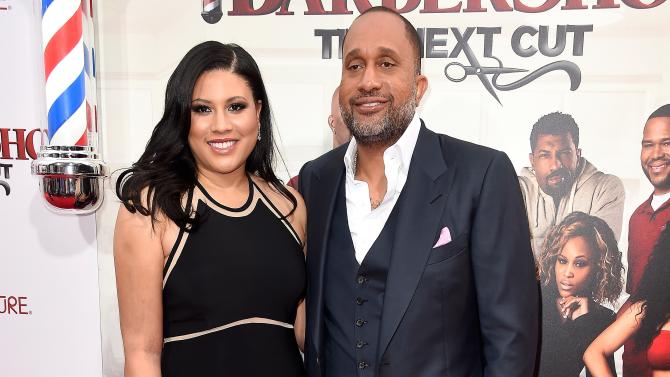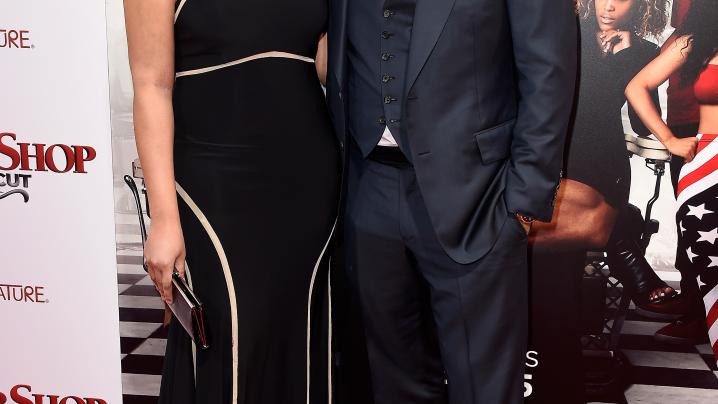[ad_1]

Writers Tracy Oliver and Kenya Barris attend the premiere of Barbershop: The Next Cut on April 6, 2016, in Hollywood, Calif.
Frazer Harrison/Getty Images
Barbershop: The Next Cut, starring Ice Cube and Cedric the Entertainer as barbers on the South Side of Chicago (the third installment of the franchise), is probably a lot funnier than most people expect, thanks in part to Tracy Oliver.
The Stanford-educated, South Carolina native first got our attention as Nina, the work nemesis of Issa Rae’s character, J, in The Misadventures of Awkward Black Girl. Oliver, who wore many other hats, including writer and producer, on the influential Web series, has since added to her IMDb profile executive story editor of Starz’s basketball drama, Survivor’s Remorse, executive-produced by NBA superstar LeBron James and loosely based on his life; and, now, Barbershop: The Next Cut.
The Root caught up with Oliver to talk about writing with Kenya Barris, of Black-ish fame, for Barbershop, as well as Awkward Black Girl, her upcoming projects and why black women drive her work.
The Root: What was the writing process for you and Kenya Barris on Barbershop?
Tracy Oliver: The fun thing about working with Kenya is we argue a lot because we’re usually on opposite sides of things because we are about a decade apart in age, far enough apart where he has experiences that I haven’t had. He’s married, he’s a family man; I’m a single woman.
There’s a lot of things we disagree on and have different perspectives on, and we brought that to the script. So we would just sometimes be like, “Let’s talk about dating,” and I would say something and he’d disagree with it, or vice versa, or sometimes we would be on the same page. And then we’d just record those conversations and figure out which characters would probably agree with me and which characters would agree with him.
He’s a lot more traditional, so he would kind of speak more for the Cedric the Entertainer character or Ice Cube’s character, and I was kind of the Nicki Minaj character or the Bree character, the one with the braids, or the nerdy-black-guy character was something I would do a lot of scripting for. So our perspectives just fit into a lot of different characters’ mouths.
TR: Was the film cast when you guys wrote the script?
TO: It was partially cast when we started, and what made the script somewhat tricky was that, after we had written a draft is when the producers sent it out to actors to try to get them cast for the newer parts, and we didn’t know. When we went into MGM, we had pitched Nicki Minaj’s character Draya as Nicki Minaj, but we didn’t know if she would actually do it. Actually, no one thought she would do it, so we were like, “Think Nicki Minaj, but we will never get her.”
TR: How did you and Issa Rae link up?
TO: Issa Rae and I were actually at Stanford together, and we met because we were always auditioning against each other. We were always the two black girls waiting to find out who got the part, and after a while it was like, “Instead of us being competitive against each other for that one part, why don’t we join up? Why don’t we start working together and collaborating and figure out how we can pursue things right and put on works for a bunch of people of color to get parts?’”
And that’s what we did. We both would produce or write, direct, act in several productions at Stanford, and we just had a great rapport there. And then, after we graduated, she called me; she was in New York and was like, “I’m coming to L.A. and I want to do this thing called Awkward Black Girl.” I loved the idea.
I was writing it with her, acting in it with her, producing it with her, and we thought it was a cool idea, but we never thought it would kick off in the way that it did. It was just something fun to do, and we knew that if we tried to pitch it to people, no one would buy it because they wouldn’t understand it. It was one of those things you had to execute and put out there and prove that there was an audience for it.
TR: How did doing it yourselves empower you?
TO: We changed the landscape of comedy, we really did, doing it ourselves. And we knew from the onset because, while we were coming up with this and about to put it out, the landscape was so white. There was nothing for people of color on the air. It was just a really cold climate, and we knew if we tried to convince people that there’s an audience for something that’s like a black Tina Fey or a black Zooey Deschanel, [that] we wanted to do a character that was quirky and nerdy and fun, [it would be hard].
When we put it out and it went viral and all of these publications were picking it up and people were clamoring to see it, it was kind of surreal. The crazy thing about the Internet age is that you can bypass the gatekeepers of Hollywood and go directly to the people. Within months, millions of people were watching it. We were getting better numbers than some cable shows online, and that was pretty crazy because we were doing it ourselves.
TR: You have a few other projects coming up.
TO: One that I’m really excited about is this Fox drama with Misty Copeland. It’s kind of like Center Stage [the 2000 ballet film that was Zoe Saldana’s first big break], but set in present-day New York City, and Misty’s been, like, an incredible partner. She shares my vision as far as wanting to [present] people of color in a great way on the show. The lead actress or the lead character is a black female ballerina, which was really important for both of us, and Fox was very supportive of that.
And I have a couple of movies at Universal with Will Packer. One is about four women gathering at Essence Fest [with Kenya Barris as co-writer]. It’s a fun party movie. It’s kind of like The Hangover meets Bridesmaids. And we wanted to do that because we don’t see black women enough getting drunk and partying and hanging out with their girlfriends, and we thought, “We do that, too, all the time; why not do, like, a fun party movie?” And that’s been really fun.
TR: Why are you so committed to showcasing black women in your work?
TO: It’s personal to me. I think that a lot of writers, no matter what race or gender, or [what] their experiences are, they want to write about themselves, and I think that’s very valid, and I think, if you are a black woman and you want to write about yourself and your mom and your sisters and your aunts and grandmothers, I think you have the right to do that. If I couldn’t tell my stories, I don’t know that I’d still want to write.
Barbershop: The Next Cut opens in theaters everywhere April 15.
[ad_2]





















